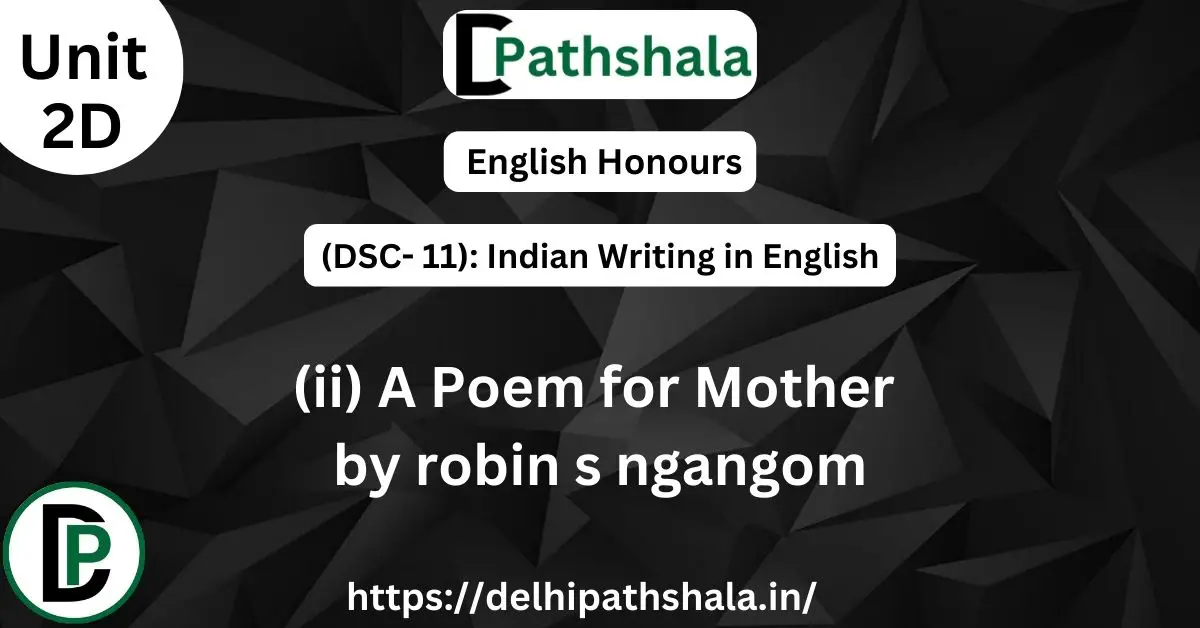In this post, notes of “Unit 2: D(ii) a poem for mother by robin s ngangom” from “DSC- 11: Indian Writing in English” are given which is helpful for the students doing graduation this year.
Read First Part: The Strange Affair of Robin S. Ngangom

A Poem for Mother
A poem for mother by robin s ngangom summary
Read Full Poem: a poem for mother by robin s ngangom pdf
“A Poem for Mother” by Robin S. Ngangom is a heartfelt look at the poet’s relationship with his mother. The poem shows love, thanks, and a desire for a mother who represents care and strength. It uses clear and warm images to show the mother’s comforting presence, while also recognizing the distance that time and life can create.
The speaker reflects on memories of his mother and honors her role in his life. He describes her with respect and love, noting the sacrifices she has made. The poem also talks about how time passes, showing both the physical absence of the mother and the lasting emotional bond that stays.
Although the poem does not go into detail about the mother’s actions, her influence is felt throughout as the speaker considers how she helped shape who he is. The poem touches on feelings of loss, love, and memory that many readers can connect to.
A Poem for Mother Themes
- Family: The main theme is the strong bond between mother and child. The poem highlights the love within a family and how the mother cares for and shapes her child’s identity. It shows how family provides support and comfort, especially during tough times.
- Love: The love between the speaker and his mother is shown with deep respect and warmth. It is an unconditional love based on shared experiences and understanding. The poem also hints at the sacrifices the mother has made, adding emotional depth.
- Memory: Memory is important as the speaker thinks back on his time with his mother. The poem carries a sense of longing for the past and shows how memories keep her presence alive even when she is not physically there.
Literary Devices: Symbolism, Metaphor, and Tone
- Symbolism: The mother symbolizes love, care, and sacrifice. She represents the home and the foundation of the speaker’s identity. Her character stands for comfort and stability.
- Metaphor: Ngangom uses metaphors to create feelings of warmth and protection. The mother is described as a source of strength and light that guides the speaker through life’s challenges.
- Tone: The tone of the poem is reflective and filled with love. It expresses a quiet respect for the mother, mixed with feelings of longing and loss due to the passing of time.
Emotional Impact and Literary Value of the Poem
The emotional impact of “A Poem for Mother” comes from its universal themes of love, loss, and memory. While it is based on the poet’s personal experiences, it resonates with anyone who has strong feelings for their family. The poem evokes nostalgia and warmth, while also hinting at sadness due to time and distance.
The poem’s value lies in its ability to express deep emotions simply and subtly. Ngangom uses straightforward language to convey feelings without being overly dramatic. This simplicity allows readers to connect with the emotions easily.
The use of symbols, metaphors, and tone adds depth to the poem. The mother symbolizes love and sacrifice, while the metaphors enhance the emotional experience. The reflective tone invites readers to think deeply about their own memories, making the poem even more engaging.
In summary, “A Poem for Mother” is a touching tribute to the bond between mother and child, filled with themes of love, family, and memory. Through his use of symbols, metaphors, and tone, Ngangom expresses complex feelings in a relatable way. The poem’s emotional power is clear, and its literary value lies in its depth and subtlety in exploring universal themes of love and loss.
4. Comparative Analysis
Comparison of Themes in Both Poems
Both “The Strange Affair of Robin S. Ngangom” and “A Poem for Mother” look at personal identity and human experiences, but they focus on different themes.
- Identity: In “The Strange Affair of Robin S. Ngangom”, identity is a key theme, showing how self-view is affected by outside factors like culture, politics, and history in Manipur. Ngangom explores how these influences shape who a person is. On the other hand, “A Poem for Mother” focuses on the poet’s identity through his relationship with his mother, highlighting emotional bonds and the importance of family. Both poems discuss identity connected to others—one in a broader social context (“The Strange Affair”) and the other in close family ties (“A Poem for Mother”).
- Family and Love: “A Poem for Mother” is all about family, emphasizing the strong bond between mother and child, and how love can overcome time and distance. This differs from “The Strange Affair”, where love is explored more indirectly, often linked to feelings of being alone and confused. In “A Poem for Mother”, love is clear and nurturing, while in “The Strange Affair”, it relates to personal struggles.
- Memory and Nostalgia: Both poems talk about memory but in different ways. “A Poem for Mother” focuses on the lasting memories of the mother and the poet’s feelings of longing. In contrast, “The Strange Affair” uses memory to deal with personal identity in a changing world.
Ngangom’s Poetic Style and Its Evolution
Ngangom’s writing style changes significantly in his poems. In “The Strange Affair”, the style is thoughtful and sometimes feels broken, reflecting the poet’s confused self-view. The tone is reflective and filled with irony. This shows Ngangom’s struggle to understand himself amid conflict and history.
In contrast, “A Poem for Mother” is more straightforward and emotional, expressing love and loss simply. The tone is warm and personal, focusing more on individual feelings rather than political issues. His style evolves from complex and indirect to more direct and personal.
Personal and Cultural Identity in Both Poems
In “The Strange Affair”, identity is closely connected to cultural and political issues. The poet’s struggle with self-understanding is influenced by the conflict in Manipur, questioning how he fits into a society that expects conformity. His exploration of identity is both internal and external, shaped by history and culture.
On the other hand, “A Poem for Mother” focuses more on personal identity, where the speaker’s sense of self is shaped mainly by love for his mother. Though it doesn’t dive deep into political themes, the importance of family is significant in forming identity. The contrast shows Ngangom’s wide range as a poet, addressing both personal and larger identity issues.
5. Critical Perspectives
Feminist and Post-Colonial Readings of the Poems
From a feminist viewpoint, “A Poem for Mother” celebrates the mother figure, whose love and sacrifices shape the poet’s identity. It highlights the important but often overlooked role of women in building family and cultural identities. There is less focus on gender in “The Strange Affair”, but it indirectly critiques societal pressures on individuals based on gender and ethnicity.
From a post-colonial viewpoint, both poems reflect on identity in the context of postcolonial struggles. “The Strange Affair” especially highlights the broken self amid political unrest. Ngangom’s work engages with identity shaped by colonial and postcolonial influences. Meanwhile, “A Poem for Mother” centers on personal identity, yet the mother symbolizes cultural heritage and resistance against forces that threaten indigenous identities.
Ngangom’s Influence on Contemporary Indian Literature
Ngangom is an important voice in modern Indian literature, known for blending personal and political themes. His focus on conflict, identity, and cultural heritage has made him a significant figure in Indian English poetry. He represents a generation of poets exploring regional identity and personal histories, giving a voice to those from northeastern India.
The Poems’ Relevance in Modern Literary Studies
Both poems are still important today for their universal themes of identity, love, and memory. They provide material for discussions on how personal and cultural histories connect and how literature can express personal feelings while also addressing societal issues. Themes of alienation and family bonds remain relevant amid global challenges like migration and political conflict.
6. Conclusion
Summary of Key Points
In this analysis, we looked at Robin S. Ngangom’s poems “The Strange Affair of Robin S. Ngangom” and “A Poem for Mother”, focusing on their themes of identity, family, and memory. We compared how Ngangom portrays personal and cultural identity, his changing poetic style, and the techniques used in both works. We also discussed feminist and post-colonial readings, Ngangom’s influence on Indian literature, and their ongoing relevance today.
Impact on Indian Literature and Legacy
Both poems contribute to discussions in Indian literature about identity, especially in a postcolonial context. Ngangom’s ability to express personal and shared histories has earned him a significant place in Indian poetry, revealing the experiences of people in northeastern India.
Personal Reflections
Personally, Ngangom’s poems offer a deep look at identity—both personal and cultural—and how people deal with complex histories. His work resonates because it speaks to universal human experiences: the search for self, family’s role in identity, and the lasting nature of love and memory. His poetry highlights the importance of reflection and how literature connects personal and shared experiences across time and space.


